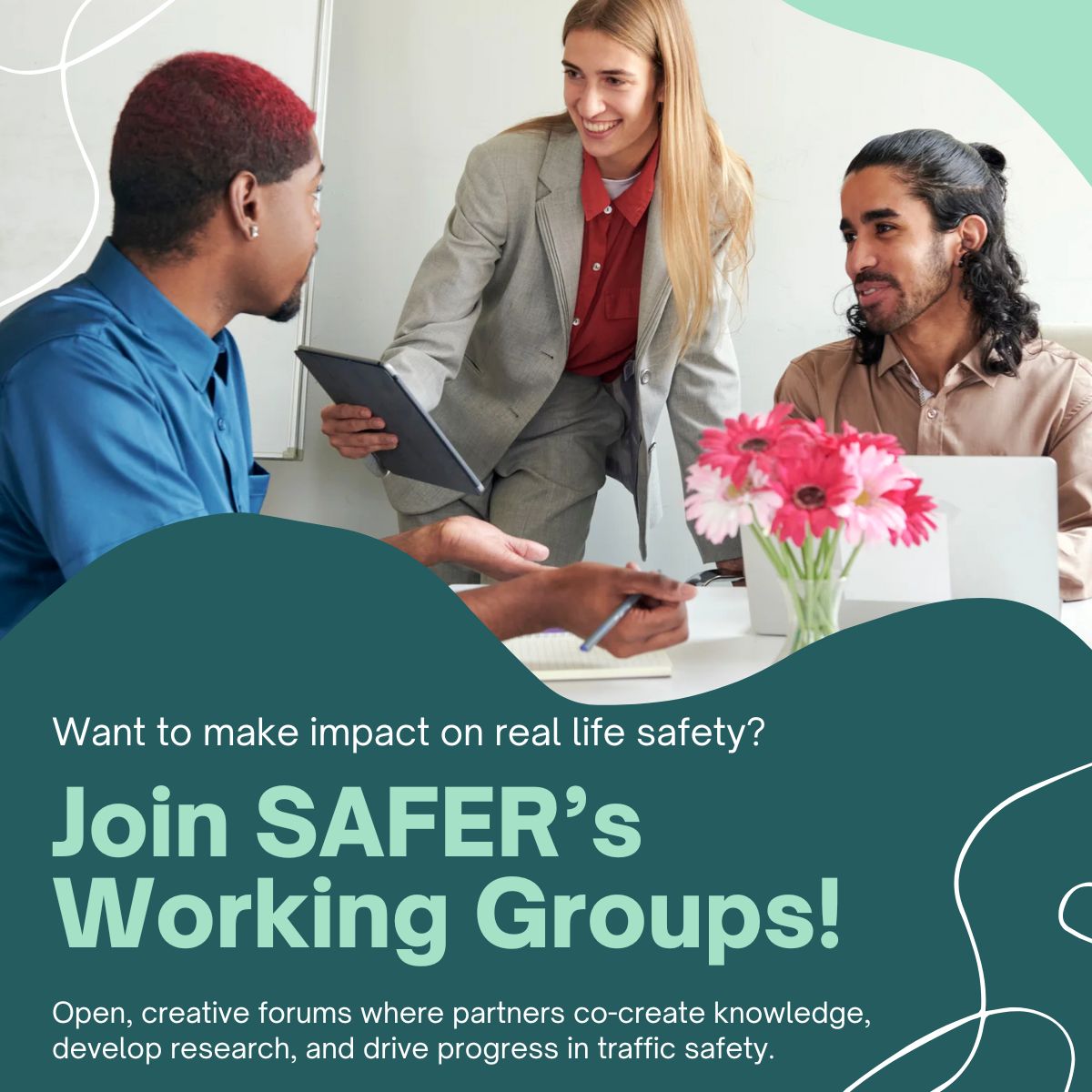Welcome to join SAFER's Working Groups
One of the true cornerstones of SAFER is our working groups – dynamic forums where knowledge is built, ideas take shape, and new research is co-created based on the priorities and needs of our partners.
These groups serve as SAFER’s main arenas for inspiration, idea incubation, and strategic collaboration. They are open to all partner organisations, and offer a valuable opportunity to explore new insights, connect across disciplines, and jointly develop research initiatives – often leading to funded projects. Many also find the groups an effective way to bring new knowledge into their own organisation’s workstreams.
We currently have 11 active working groups, each with its own focus and way of working – fully shaped by the members’ interests and engagement. The SAFER office supports the groups with coordination and practical help.
We warmly encourage all partner employees to get involved. Whether you are looking to stay updated, exchange ideas, develop concrete projects – or simply be part of a creative and engaged community – the working groups are a great place to start. And it is also fun! 😊
Interested in joining a group – or starting a new one? Don’t hesitate to reach out to us at safer@chalmers.se. New participants are always welcome, and we’re keen to support new topics if there’s interest. It’s important that SAFER remains a platform shaped by your needs and ambitions.
Below you will find a brief description of each active group. For more detailed information and upcoming deliveries, visit SAFER Inside here (pls contact Sophia (ekesand@chalmers.se) if you don’t yet have access).
***
ALTERNATIVE FUEL POWERTRAIN SAFETY
Co-hosted by PICTA and SAFER, this group focuses on safety enhancements for alternative fuel powertrains, such as electric, gas, and hydrogen vehicles. They address needs like accident response, storage, and firefighting, aiming to improve safety during transport and refueling for emergency responders and the public. Currently, the regulations governing hydrogen are being revised, and we see an opportunity for research on how to leverage emerging technologies such as IoT. These advancements could improve emergency response routines and the post-crash management of damaged vehicles. Since this topic requires multiple areas of expertise, we are interested in exploring collaborations. If you would like to participate, please feel free to reach out to us.
CONNECTED SAFETY
This working group will dive into what role connectivity (communication by sharing of data between different actors) can play for road traffic safety looking at status, opportunities, and challenges in avoiding or mitigating accidents not least with unprotected road users.
LONG-TERM IMPAIRMENTS FROM INJURIES IN TRAFFIC ENVIRONMENT
This group focuses on long-term medical impairments from non-life-threatening traffic injuries. Their goal is to understand these injuries, their impacts, and ways to prevent long-term impairments. SAFER experts will lead the effort, engaging the wider community for a comprehensive understanding.
POST CRASH
Post-crash response is vital for addressing fatalities, severe injuries, and long-term consequences. Co-hosted by PICTA and SAFER, this group tackles challenges like ensuring smooth information flow, maintaining quality, and enhancing availability among involved parties.
ROAD ACCIDENT STATISTICS
This group analyses traffic data for road safety insights, focusing on accident types, frequencies, and countermeasure efficiency. Using various databases, they develop global methodologies and research projects. Outcomes include methodology development, research reports, and collaborations to enhance road safety.
ROAD USER BEHAVIOUR
This group focuses on safe behavior in the transport system, including (automated) vehicle-human interactions, human factors in technology, vehicle and infrastructure usage support, road user behavior monitoring tools, driver impairment countermeasures, and behavior change promotion.
REMOTE OPERATIONS
Remote operations present both opportunities and challenges for the future of traffic safety, and this new working group will focus on developing expertise and sharing insights on how remote operations can support the transition to safe, automated transport.
SAFE INFRASTRUCTURE
This group investigates road infrastructure's impact on traffic safety, evaluating current research and identifying directions for advancement. Goals include promoting a multidisciplinary approach, aligning challenges with future mobility, and developing proactive safety assessment methods.
SAFETY OF AUTOMATED DRIVING SYSTEMS
Focused on enhancing automated driving technology adoption, this group tackles complexities in automating driving tasks and uncertainties in predicting safety improvements. It explores links to safety benefit assessment, sensing, human behavior, and safety performance indicators.
SAFETY OF COMPLEX SYSTEMS AND EMERGING TECHNOLOGIES
This group addresses evolving traffic safety challenges amid advancing technologies and industry shifts. Emphasizing agile safety assurance, it considers technology capabilities, human factors, and intricate system dependencies. From components to transport services, their approach aims to ensure safety in a complex environment.
TO IDENTIFY AND IMPROVE YOUR COMPANIES’ WORK WITHIN TRAFFIC SAFETY
Through a series of workshops, we guide companies in improving their safety practices. Covering influence, commitment, monitoring, and safety culture, we provide practical examples and guidance tailored to each step. The outcome: a comprehensive report with actionable insights.

